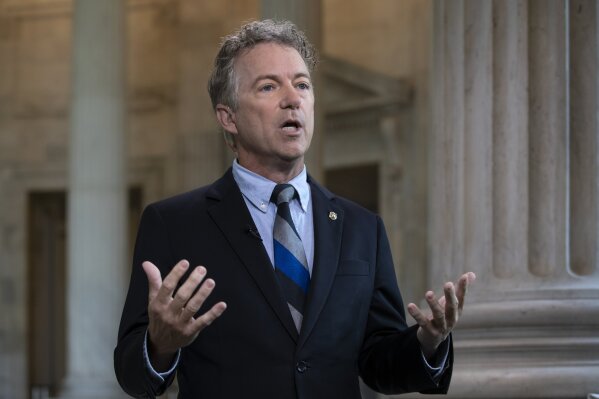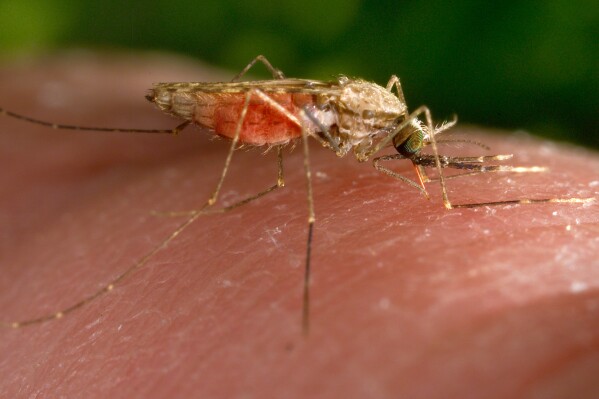Bill Gates-funded climate change venture doesn’t call for razing 70 million acres of trees
Tahoe National Forest supervisor Eli Ilano, foreground, walks past a pile of cut down trees, Tuesday, June 6, 2023, near Camptonville, Calif. The Associated Press on Wednesday, Sept. 13, 2023 reported on social media posts falsely claiming that Bill Gates is backing efforts to cut down 70 million acres of trees in order to fight global warming. (AP Photo/Godofredo A. Vásquez)
CLAIM: Bill Gates is backing efforts to cut down 70 million acres of trees in order to fight global warming.
AP’S ASSESSMENT: False. There is no plan to cut down 70 million acres of trees. The U.S. Forest Service has a ten-year plan to reduce the risk of wildfires across millions of acres of forests in the American West through a combination of controlled burns, selective tree culls and other forest management strategies. Gates, separately, is among the investors in a company proposing to help thin out California’s densely packed forests and bury tree remains in Nevada.
THE FACTS: Bill Gates is once again at the center of false reports on social media for his commitment to addressing the impacts of climate change.
The latest accusation is that he’s willing to raze millions of acres of forestland to do it.
Many users are sharing a video that features a woman speaking in front of a screenshot of a story on a website known to publish fake or misleading content.
“Bill Gates Pushes Plan to Chop Down 70 Million Acres of Trees to ‘Fight Global Warming’,” the story headline reads.
“How is this green? the woman on the video says incredulously to the camera. “How is this helping the planet?”
“Mr gates at it again,” echoed an Instagram user who shared the video. “How does cutting down 70 million acres help climate issues?”
But the billionaire Microsoft founder isn’t advocating for leveling millions of acres of forest.
Instead, he’s among the lead investors in Kodama Systems, a startup company seeking to selectively remove trees from dense, wildfire-prone forests in California and bury their remains across the state line in Nevada.
Gates, through his Breakthrough Energy Ventures, which invests in companies developing technology and other innovative solutions to global warming, is among a group of funders that have committed $6.6 million to the company, according to a December press release.
“These claims are false,” Alex Reid, a spokesperson for Bill Gates, wrote in an email Tuesday. “Kodama has developed forest management systems designed to increase forest productivity, prevent catastrophic wildfires, and increase carbon capture by burying dead trees to permanently store the carbon they captured over their lifetimes.”
Kodama spokesperson James Sedlak similarly rejected the claims as false, noting that the 70 million acres cited in the posts misrepresent a figure cited in a Forbes article about the company.
The July article states the U.S. Forest Service aims to “thin” some 70 million acres of densely packed forest in the American West in order to mitigate the risk of severe wildfires.
“As written, this does not mean cutting down all trees in those acres and was subsequently misconstrued, likely leading to the narrative that came across your radar,” Sedlak wrote in an email Wednesday.
What the Forest Service and Kodama are actually seeking to do is known as “ecological forest thinning,” in which certain, at-risk trees are culled from dense patches of forest in order to allow mature ones to thrive, he explained.
Sedlak acknowledged it “may seem counterintuitive” but tree thinning is important not just for improving wildfire resilience but overall forest health.
Kodama is aiming to win forest thinning contracts offered by the Forest Service, other public agencies and private landowners.
Merritt Jenkins, the company CEO, said it hopes to focus on a remote part of the Eastern Sierra Mountains in California, cutting down relatively small trees that can’t easily be turned into lumber.
But instead of burning the unusable trees, as typically happens in thinning efforts, the company would take the remains and bury them at an arid site in Nevada, he said in a phone interview Wednesday.
The goal would be to avoid the costly and harmful effects of burning, while also preventing decay, a process that also releases carbon into the atmosphere, Jenkins explained.
“We want to store that carbon for an indefinite period of time,” he said.
___
This is part of AP’s effort to address widely shared misinformation, including work with outside companies and organizations to add factual context to misleading content that is circulating online. Learn more about fact-checking at AP.





